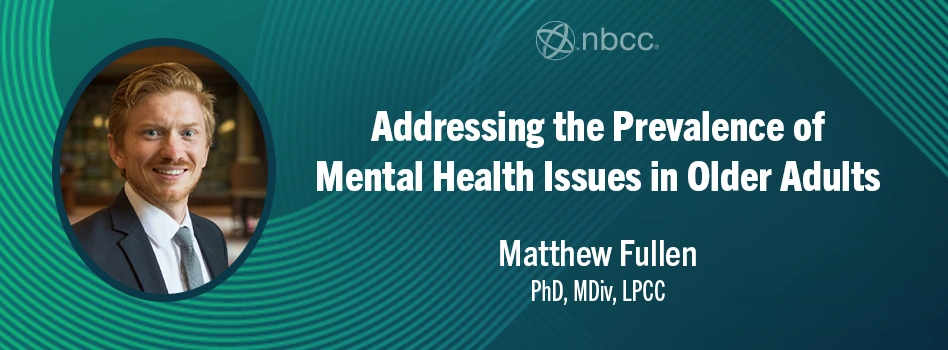
According to the National Council on Aging, up to 25% percent of adults aged 65+ are living with a mental health issue such as anxiety, depression, or other mood disorder(s). Substance use has also been on the rise among this age group for many years. However, less than half of these individuals receive treatment.
We recently spoke with Matthew Fullen, PhD, MDiv, LPCC, an Associate Professor in the counselor education department at Virgina Tech, about the prevalence of mental health in older adults, as his extensive research heavily focuses on this population.
“While the perception that getting older is exclusively a time of decline, this is not necessarily the case,” says Dr. Fullen. “Older adults actually tend to have higher life satisfaction than younger groups. With that said, aging can obviously come with challenges, including finding purpose, social issues, and family/friend relationships and losses, all of which can affect our mental well-being.”
To combat such high rates of mental health issues among older adults, Dr. Fullen believes we need a paradigm shift.
"Ageism is a major challenge impacting older adults. If a college-aged student were to present as suicidal, the societal norm would be to rally and support with all possible resources available. However, given this perception of natural decline in older adults, our response in helping them may be slower, or forgotten altogether.”
If we truly believe in social justice and equity, Dr. Fullen suggests approaching and supporting older adults in the same manner as we do younger populations. This could help bring the prevalence of mental health issues in older adults down.
Dr. Fullen reports that one in four individuals who are of Medicare-eligible age suffer from a mental health issue(s). Particularly staggering, in White men aged 85+, the suicide rate is four times the national average among all age groups.
“If we fixate on areas of decline as we age, it can become a self-fulfilling prophecy. Counselors should think more broadly and first process their own thoughts on aging, then help their clients diversify their portfolio of meaning so that their mental health stabilizes as years progress.”
With that said, Dr. Fullen believes older adults are more resilient than their younger counterparts.
“During and post-COVID, depression and anxiety rates were obviously elevated. In my observations though, older adults actually handled it better than younger adults.”
It can be challenging for older adults to find resources available to them today for many reasons, including society’s continued technological advances and dependence. However, when they do receive even the slightest support, Dr. Fullen believes it gives them traction. Once they understand what counselors do and engage with counseling, it can be just as effective as it is with younger populations.
Dr. Fullen recommends placing information in senior centers and retirement homes, just as we do in schools for younger age groups.
“We need to remind ourselves that while aging does come with its challenges, a plethora of opportunities come with it, too,” concludes Dr. Fullen.
Dr. Matthew Fullen is an Associate Professor at Virginia Tech, where he teaches in the counselor education program. Dr. Fullen's research, teaching, and advocacy focus on the mental health needs of older adults, with an emphasis on addressing gaps in Medicare mental health policy and developing programs to enhance resilience and wellness and prevent suicide among older adults. Dr. Fullen is the counseling profession’s most active scholar on aging and mental health, with over 35 peer-reviewed publications and over 95 peer-reviewed conference presentations and keynotes. Dr. Fullen has received research grant funding from both public and private entities, including the U.S. Department of Health & Human Services, as well as The Mather Institute, to develop programs that support older adults’ mental health. In recognition of his research and professional leadership related to Medicare advocacy, he has received the Virginia Tech Land Grant Scholar Award, as well as three national awards from the American Counseling Association (Counselor Educator Advocacy Award [2023], Research Award [2021], and Carl D. Perkins Government Relations Award [2020]). More information about his work can be found at agewellcounseling.org.